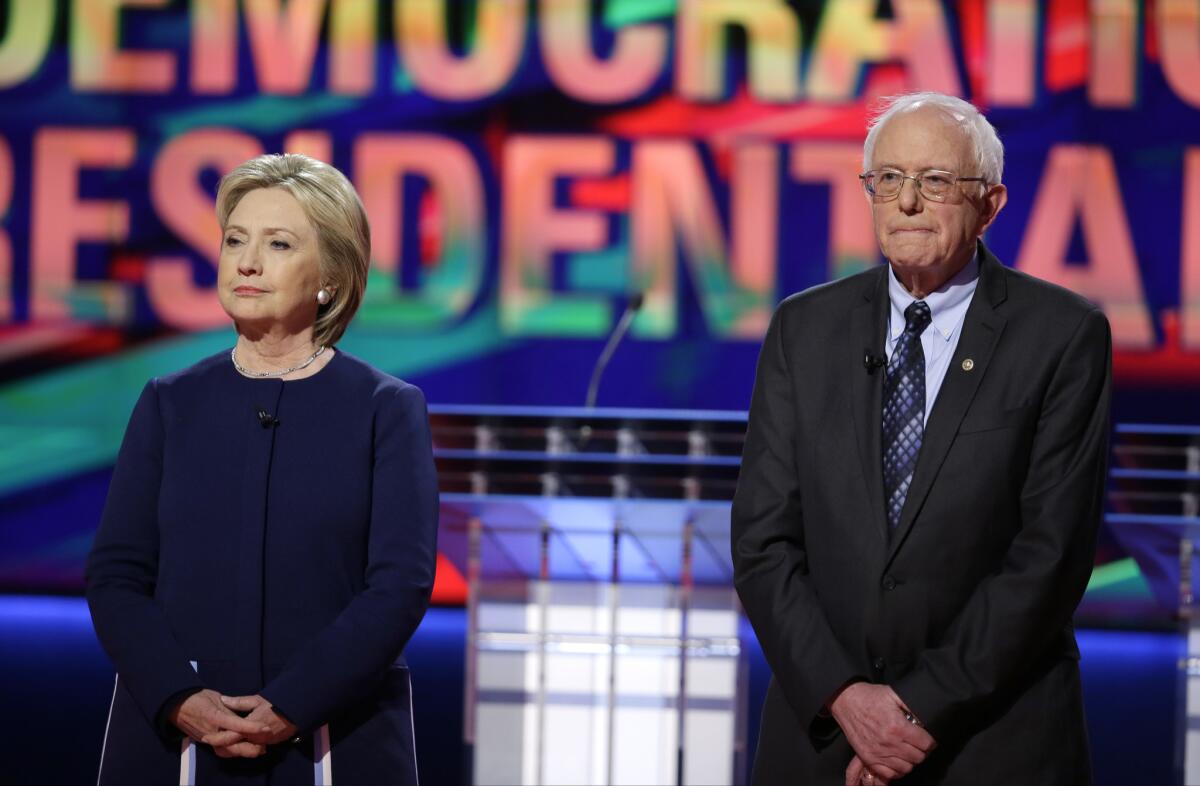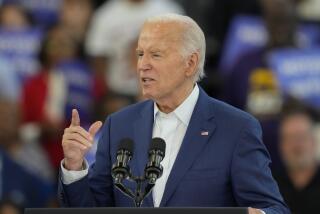Column: Can Hillary Clinton unite the Democrats?

Democratic presidential candidates Hillary Clinton and Bernie Sanders stand on stage before a primary debate at the University of Michigan-Flint in Flint, Mich. on March 6.
- Share via
The battle between Hillary Clinton and Bernie Sanders hasn’t turned into a playground brawl like the Republican campaign, but it has still pitted Democrats against each other, sometimes bitterly. Sanders has slammed Clinton as a candidate in the pocket of billionaire donors. Clinton has dismissed Sanders as a dreamer who can’t get things done. And some of their followers have been nastier than that.
After a divisive campaign, can Clinton win support from Sanders voters if she wins the nomination, as appears likely? She can and she will — but it’s going to take some work.
That’s a bitter pill for Sanderistas to swallow while their candidate is still slogging from state to state in pursuit of a long-shot comeback. Some are already organizing a sullen resistance movement under the slogan “Bernie or Bust.” Its organizers are asking progressive voters to pledge not to vote for Clinton, no matter what.
We’ve seen that kind of rearguard action before, and it almost never works. In 2008, a group of die-hard Clinton supporters pledged never to vote for Barack Obama; their mostly female group was called PUMA, an acronym for “Party Unity My ....” By election day, they were forgotten.
“People who come out to vote in primaries rarely sit out general elections,” noted Democratic strategist Mark Mellman, who isn’t working for either candidate. “Almost all Sanders voters will end up backing Clinton, assuming she gets the nomination.”
The most obvious reason: In the general election, Clinton will of course be running against a Republican, most likely Donald Trump or Ted Cruz, and Democrats will try to turn the election into a referendum on the GOP nominee, no matter which widely loathed name is on the ticket.
“Three months ago, the question for Hillary was: What am I going to do to energize the [progressive] base,” another Democratic operative told me. “That problem went away, thanks to Donald Trump.”
Some party strategists think Cruz, a beyond-the-mainstream conservative on social issues, would be even easier to defeat.
But the GOP candidate won’t be Clinton’s only asset. Once she’s sewn up the nomination, she’ll collect two endorsements that could sway skeptical progressives: one from Sanders, the other from Sen. Elizabeth Warren (D-Mass.).
“There’s going to be no reluctance on his part” if Clinton wins, Sanders’ chief strategist, Tad Devine, told me. “He has said that Hillary Clinton is extremely well qualified to be president. Meanwhile, he’s competing, and it’s going to go all the way to the end of the primaries.”
Warren hasn’t said when she’ll make an endorsement, but she’s already thinking about how she could play a role in helping Clinton win — and, meanwhile, nudging Clinton toward more progressive positions.
“Economic populism is driving a lot of the debate,” a person familiar with Warren’s thinking told me. “She knows how to communicate and operate in that space. She takes seriously her role in helping Democrats get it right.”
Clinton has been campaigning as a progressive all along -- just as an incrementalist progressive, not a revolutionary like Sanders.
Warren has already lobbied Clinton to support expanding Social Security benefits, a favorite progressive goal. Last month, Clinton promised not to seek benefit cuts and said she wants to increase benefits for the poorest beneficiaries.
Warren also helped persuade Clinton to endorse legislation banning Wall Street executives from accepting “golden handshake” payments from their firms when they get government jobs.
In fact, Clinton has been campaigning as a progressive all along — just as an incrementalist progressive, not a revolutionary like Sanders.
She supports a higher federal minimum wage — just not as high as Sanders. She wants to expand financial aid to poor students and make community colleges tuition-free — but not all public four-year universities, as Sanders has proposed. She wants to expand President Obama’s health insurance program, but not convert it to a European-style “single payer” system, as Sanders wants.
She even has a campaign finance reform plan — although it’s not as radical as her rival’s. After her defeat in New Hampshire, she tried to sound as fired up as Sanders about that issue.
“Sen. Sanders and I both want to get secret unaccountable money out of politics,” she said. “You’re not going to find anybody more committed to aggressive campaign finance reform than me.”
But Clinton’s biggest problem with progressives isn’t her policies; it’s her history. Polls have long shown that many voters, including Sanders backers, don’t quite trust her. In New Hampshire, voters who ranked honesty as a high priority favored Sanders over Clinton, 92% to 6%.
Clinton knows that.
“I understand that voters have questions,” she told an interviewer in January. “I think there’s an underlying question that maybe is really in the back of people’s minds, and that is: ‘Is she in it for us or is she in it for herself?’ I think that’s a question people are trying to sort through.”
A credible answer to that question, a little help from Sanders and Warren, and continued chaos in the GOP will make it possible for Clinton to reunify her party for the fall campaign.
Twitter: @doylemcmanus
Follow the Opinion section on Twitter @latimesopinion and Facebook
More to Read
A cure for the common opinion
Get thought-provoking perspectives with our weekly newsletter.
You may occasionally receive promotional content from the Los Angeles Times.











